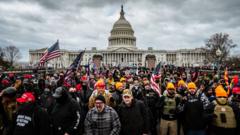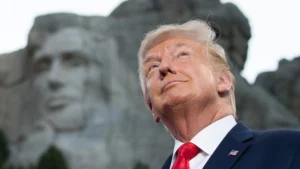Rep. Andy Ogles has introduced a resolution aimed at amending the U.S. Constitution to permit President Donald Trump and future presidents to serve a third term. This initiative, targeting the current restrictions of the 22nd Amendment, reflects Trump's enduring impact on the Republican Party and raises concerns about democratic principles and executive power limits.
Proposal to Amend Constitution Signals Trump's Resilient Influence in GOP

Proposal to Amend Constitution Signals Trump's Resilient Influence in GOP
A Republican congressman advocates for a constitutional change to enable Trump to serve a third presidential term, igniting fierce debate.
Rep. Andy Ogles, a Republican representative from Tennessee, has recently put forth a resolution to amend the U.S. Constitution, aimed at allowing President Donald Trump to seek a third term in office. This extraordinary move comes just days into Trump's second term, and it seeks to modify the 22nd Amendment, which presently restricts presidents to no more than two terms. The proposal underscores the steadfast loyalty of Trump’s supporters and the determination among certain Republicans to prolong his influence.
On Thursday, a Republican House member announced the resolution to amend the Constitution to facilitate a third presidential term for Donald Trump and any future presidents. The 22nd Amendment, which was ratified in 1951 following Franklin D. Roosevelt’s unprecedented four-term presidency, explicitly states that "no person shall be elected to the office of the President more than twice." This amendment aimed to prevent any single individual from consolidating power over extended periods. However, Rep. Ogles believes Trump deserves an exception, asserting, "He has proven himself to be the only figure in modern history capable of reversing our nation’s decay and restoring America to greatness."
The proposed amendment is crafted to specifically include only those individuals who have not served two consecutive terms, effectively limiting it to Donald Trump and invalidating former presidents like Bill Clinton, George W. Bush, and Barack Obama. This targeted approach has attracted criticism from Democrats and legal experts, who argue it sets a worrying precedent by customizing constitutional amendments for one person.
Amending the Constitution is a challenging endeavor that requires a two-thirds majority in both the House and Senate, in addition to ratification by three-fourths of state legislatures. Given the current polarized political environment, Ogles' resolution is expected to face substantial hurdles. Democrats, vehemently opposed to Trump's policies, are unlikely to endorse any measures that would extend his presidential tenure. In a related effort last year, Rep. Dan Goldman, a Democrat from New York, introduced legislation to bolster the 22nd Amendment to prevent Trump from serving beyond two terms.
Despite the formidable challenges presented, Ogles’ resolution has invigorated Trump's base, interpreting it as a means to secure the achievements made during Trump's administration. The former president has previously made light of the possibility of running for a third term, humorously suggesting to House Republicans, “I suspect I won’t be running again, unless you say, ‘He’s so good we’ve got to figure something else out.’”
While it remains improbable that the resolution will succeed, it serves as a barometer of Trump's lasting effect on the Republican Party and the ongoing discussions surrounding presidential term limits. Critics caution that amending the 22nd Amendment for an individual undermines the democratic process and the necessary checks on executive authority, while supporters claim such measures are needed to address the nation’s challenges under Trump's leadership.
Rep. Andy Ogles’ initiative epitomizes the enduring commitment of Trump’s supporters and their yearning for his sustained presence in American political life. Whether this resolution gains any traction or ultimately becomes a footnote in political history, it brings to the forefront continuing debates regarding Trump’s influence and the principles of presidential governance.





















